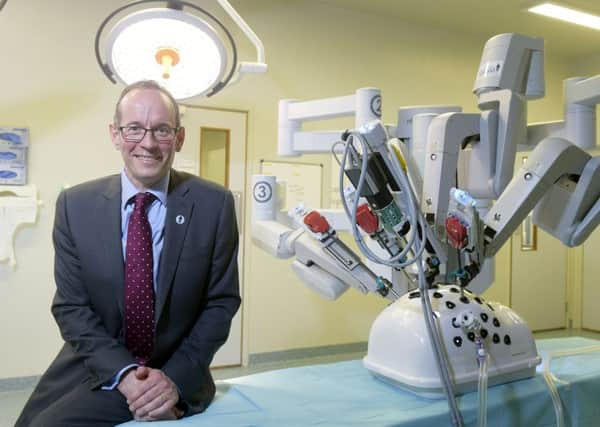Lothian gains £1.4m surgical robot to help cancer patients


Bruce Loughlin, 60, was devastated when he was diagnosed with prostate cancer in March after a routine check-up.
Doctors decided to offer him the chance to be one of the first patients to have surgery using the £1.4 million da Vinci SI Surgical System at the Western General Hospital, which has saved 50 lives since it was introduced in July.
Advertisement
Hide AdAdvertisement
Hide AdThe cutting-edge technology is operated by a surgeon, who uses a console to control the four robotic arms doing the surgery.
As it is more accurate than traditional procedures, patients face less pain and shorter recovery times.
Bruce, of Balerno, spent only two days in hospital compared to five days for traditional procedures, and he was back riding his bike within weeks.
The dad-of-two, who now works in the custodial office of Police Scotland, said: “My diagnosis was a real shock, as there were no symptoms. I knew there had to be surgery. It was such a quick turnaround afterwards – I was up on my feet the next morning.
“I’ve been able to get back to my normal life really quickly.
“I’m very lucky to have been involved.”
Doctors have given Bruce a good prognosis but he will need regular check ups to make sure the cancer does not come back.
Professor Alan McNeill, a consultant urological surgeon at NHS Lothian, said: “The technology means patients can go back to the ward without the need for drips or morphine.
“They’re able to eat and drink the same evening and most can get up the next day and shower themselves.
Advertisement
Hide AdAdvertisement
Hide Ad“In general, patients are discharged from hospital within a couple of days and return to a fully active life within four weeks.
“By training a team of surgeons to use the robotic system we will be able to offer the benefits of minimal access surgery to more men within a shorter timeframe.”
Campaigners said it was “a significant step forward” for treating the disease, which affects more than 2500 Scots per year.
Robert Wilson, chair of Prostate Scotland, which helped to fund the technology, said: “It is great news that now men in the East and South of Scotland have access to robot-assisted surgery for prostate cancer. Prostate Scotland welcomes this significant step forward in treatment options.”
Patients from Lothian, Fife, the Borders and Dumfries and Galloway will be eligible for the surgery, which was rolled out in Glasgow and Aberdeen earlier this year.
Health Secretary Shona Robison launched the service yesterday, which could help around 180 patients per year.
She said: “Robotically assisted prostate cancer surgery is a vitally important service for men as it has been shown to shorten the length of stay and period n eeded to recover following treatment.
“This is why the Scottish Government provided £3m of funding for the purchase of robots in the north, west and, now, south east of Scotland.”